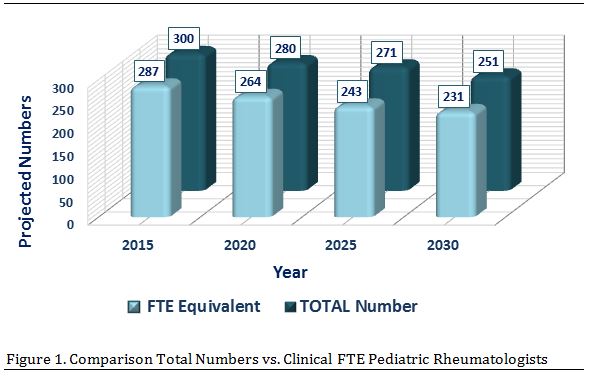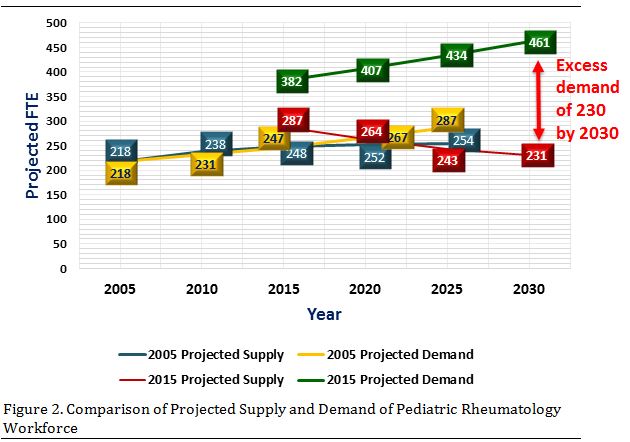Session Information
Date: Sunday, November 13, 2016
Title: Health Services Research I: Workforce and Quality of Care in Rheumatology
Session Type: ACR Concurrent Abstract Session
Session Time: 2:30PM-4:00PM
Background/Purpose: The 2015 ACR Workforce study updated the current and projected pediatric rheumatology workforce for the next 15 years.
Methods: The 2015 ACR/ARHP Workforce Study was completed using several primary and secondary data sources, including, ACR member data, state licensure registries, 2005 ACR workforce study, professional organizations, and other medical literature. These data were supplemented with a web-based survey to collect information about work settings, practice patterns, retirement planning, and demographics. Utilizing an integrated workforce modeling methodology, supply and demand projections were computed for pediatric rheumatologists from 2015-2030. The factors affecting supply included the current pediatric rheumatology workforce, demographic changes, completed fellowships, retirement trends, patient workload and practice settings. Multivariate regression modeling was used to determine significant factors affecting demand. These included healthcare utilization, provider practice trends, disease prevalence, population demographics, per capita income and access to care trends. Clinical FTE was defined as 1.0 FTE for private practice and 0.5 FTE for academic practice and compared to actual projections (Figure 1), assuming 95% of the pediatric rheumatology workforce was in academic practice vs. 5% in private practice.
Results: The 2015 ACR current pediatric workforce is estimated to be 300 providers (287 Clinical FTE). The majority (56%) of pediatric rheumatologists are in the Northeast, Mid-Atlantic and Great Lakes Regions. There are two states that have no board-certified practicing pediatric rheumatologists (Alaska, New Mexico) and many states where there is only 1-3 covering the entire state. A 20% reduction in supply coupled with a 21% increase in need results in a projected excess demand of about 100% pediatric rheumatologists by 2030 (461-231=230) (Figure 2). Projected need is much greater when compared to that projected in 2005.
Conclusion: This severe shortage of pediatric rheumatologists is likely due to several factors, including increases in projected patient population, coupled with the decrease in clinical FTE due to increases in females, part-time, and millennial workers. Additionally, the number of unfilled fellowship positions average 40% each year contributing to the shortage. As a result, patients in need have severely limited access to the care. Regional and innovative recruitment strategies will be necessary to help increase the supply, manage access to care and reduce barriers to care for pediatric rheumatology patients.
To cite this abstract in AMA style:
Battafarano D, Monrad S, Ditmyer M, Imundo L, Klein-Gitelman M. 2015 ACR/ARHP Workforce Study in the United States: Pediatric Rheumatologist Supply and Demand Projections for 2015-2030 [abstract]. Arthritis Rheumatol. 2016; 68 (suppl 10). https://acrabstracts.org/abstract/2015-acrarhp-workforce-study-in-the-united-states-pediatric-rheumatologist-supply-and-demand-projections-for-2015-2030/. Accessed .« Back to 2016 ACR/ARHP Annual Meeting
ACR Meeting Abstracts - https://acrabstracts.org/abstract/2015-acrarhp-workforce-study-in-the-united-states-pediatric-rheumatologist-supply-and-demand-projections-for-2015-2030/


